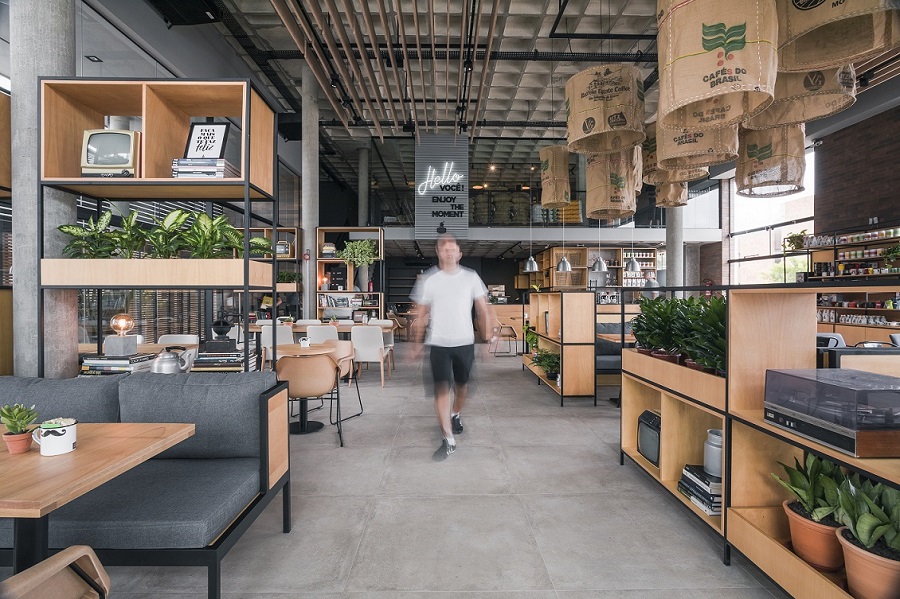RIO DE JANEIRO, BRAZIL – The pandemic changed many aspects of people’s lives, forced half of the world to work indoors, created businesses, and closed others, but one thing seems to have remained unaltered: the habit of drinking coffee.
The consumption of Brazilians’ favorite energy drink has actually increased, albeit shlightly, last year. It amounted to 21 million bags, 1.3% more than the previous year, according to ABIC, the industry association.
Much of this consumption has come from people locked at home in search of inspiration in the midst of the dull routine of videoconference meetings – and other frustrations brought on by life in quarantine.

The demand for coffee kits for home consumption explains, to a large extent, the pace of the accelerator kept by the founding partners of Café Cultura, a chain of premium coffee shop franchises opened in the heart of Lagoa da Conceição, one of Florianópolis’ main tourist attractions, in 2004.
Since then, the business has become a franchise, and today it has 18 stores in the main cities of Brazil’s Southern region. With revenues estimated by the market at around R$20 million (US$3.5 million) per year (the company does not disclose the amount), Café Cultura is leveraging the pandemic to advance its strategy of opening units across the country.
In April, Café Cultura is opening its first stores in the country’s Southeast region – the capital of Rio de Janeiro should host stores, then Minas Gerais. The goal is to reach 46 units by the end of this year. In 5 years, the goal is to have 246 stores.
The pandemic has inevitably brought significant changes to Café Cultura. Delivery became a relevant business. The menu gained brunch kits and other breakfast lines for home consumption. “We got into delivery and got to know the client better in the pandemic,” says partner Luciana Melo. “E-commerce today invoices virtually everything per month that it moved in the whole of last year and accounts for close to 10% of total sales.”
The Café Cultura business started with Luciana Melo, from Minas Gerais, and Joshua Stevens, from California, a couple who had recently left the busy life in São Paulo in search of the quality of life enjoyed by most Florianópolis residents.
Stevens had worked in bars, cafés and restaurants in California. Luciana, in turn, was looking for entrepreneurship after years of experience as a corporate executive.
The business gained notoriety when it became one of the first in the country to work directly with rural producers in Minas Gerais to offer exclusive beans – and to roast and grind the coffee themselves, instead of buying the ready-made product at the plant.
With exclusive products in hand, came expansion. To this end, in 2017 the couple teamed up with Carlos Zilli, Nanina Rosa, and Cecilia Rosa, ex-partners of the Imaginarium home and gift items retail chain, whose embryo was also in the surroundings of Lagoa da Conceição, where Café Cultura started. Zilli, ex-president of Imaginarium, today coordinates the coffee shop’s national expansion.
Café Cultura’s challenge is to expand quickly in a still niche market in Brazil.
Although coffee shops are present in much of the busy regions of Brazilian cities, the high-end market desired by Café Cultura is still dominated by a few chains in the country, such as Santo Grão, Suplicy and Starbucks.
The sector has suffered in the pandemic, as evidenced by the closure of two units of Octavio, one of the main coffee shops in São Paulo. Until last year, the chain’s original unit, almost at the corner of Faria Lima and Cidade Jardim Avenues, the financial heart of São Paulo, was the number 1 meeting point for business in the region.
In July last year, due to the drop in attendance caused by the quarantine, the chain closed the doors of the two units (the other was in the upscale shopping mall Cidade Jardim, also in São Paulo) and is currently dedicated to selling specialty coffees over the internet.
Despite the setbacks for those who depend on physical stores caused by the pandemic, the scenario for Café Cultura is promising because of the expansion of the specialty coffee market in the country. Consumption of this category grows from 15% to 20% a year, well above the coffee sector as a whole, which is 3% a year, according to data from BSCA, the Brazilian association of specialty coffees.
The franchises have also shown to be a business model resistant to the pandemic. The sector’s revenue grew 23% in the last three months of 2020 compared to the previous quarter, according to ABF, the Brazilian franchising association.
Although the industry has not yet been able to measure the impact of the second wave of contagions by Covid-19, which forced the closure of trade in much of the country in March, the revenue of Brazilian franchises is close to the pre-pandemic level.
To attract franchisees, Café Cultura has created adapted business models. They range from a unit in a tuk tuk car – the investment in a store of this type costs R$100,000 – to more elaborate formats, such as bistro, mini bistro, kiosk and to-go.
On another front, the menu is adding special products to mark popular commemorative dates for commerce, such as Easter and Mother’s Day.
The goal now is to expand delivery to all store models in order to reduce the risks of opening and closing prompted by the pandemic. “Today trade lives from analyzing decrees,” says Luciana, about the multitude of municipal laws with sanitary protocols to fight the health crisis.
Betting on delivery and a menu adapted to consumers at home, Café Cultura wants to show that certain things, such as the habit of drinking coffee, continue to provide good opportunities for entrepreneurs even during the setbacks caused by the pandemic.
Source: Exame

